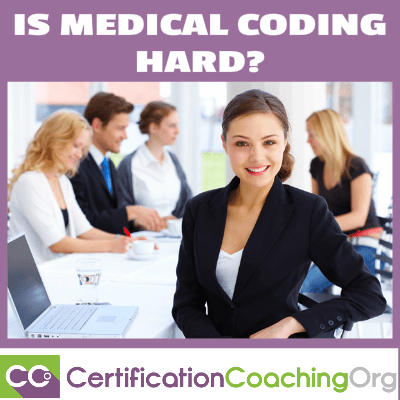Medical coding careers are undeniably in-demand in today’s day and age — with a job growth expected to increase by 22% between 2012 and 2022, which means that there will be a great job waiting for you! So don’t get discouraged if a medical coding training program seems too hard to begin or finish; it may be easier than you think.
Below are collections of medical coding questions frequently asked by coders who are new in medical coding field or are interested in learning medical coding but doesn’t know where to start. Check out some of these:
Q: Is medical coding hard?
“Medical coding is not difficult for the right person,” says Pam Brooks, coding manager for Wentworth-Douglas Hospital. It requires attention to detail because nothing can be missed when processing patient information and everything needs to be assigned the proper code.
Medical coding may not be as simple as tying your shoes but it is not impossible either. There is a lot that goes into the work so earning a medical coding degree is a worthwhile step in the process so that you can be well-versed in the subject when you go out into the job market.
As there are thousands of codes and accuracy is essential, this profession does come with its challenges. Medical coders and billers use thousands of codes from multiple code sets (ICD, CPT, HCPCS) that are updated frequently. They also convert complex medical information into clearly defined sets of codes, which demands a knowledge of health topics such as anatomy, physiology, and medical terminology.
The most challenging point comes for students that are just starting out. It requires the knowledge of anatomy, physiology, pathophysiology, and medical terminology to successfully learn the coding systems, says Denise Reitmeyer, Rasmussen College HIT program coordinator. Source: https://www.linkedin.com/pulse/mastering-medical-coding-hard-you-think-staffing-recruiting
Is Medical Billing and Coding a Good Career Choice? – CCO Advice VIDEO

Q: What are the most challenging aspects of medical coding?
Human anatomy has a lot of grey areas but medical coding is black and white. The challenge comes in transforming cloudy and complex medical symptoms into clear, discernible codes.
For example, ICD-10 students must understand the symptoms that are integralto a disease, explains Reitmeyer. The doctor will pass along case information with notations about the symptoms and coders are responsible for pulling out the important parts to document.
Attention to detail is critical, says current Rasmussen College student, Teresa Martini. You have to re-check your work against the alphabetical coding list which can be time consuming and tedious, but ultimately helps to eliminate errors.
It is also challenging to keep up with industry changes. Existing medical codes are updated, changed or discarded every year.
And the most important part for learning medical coding is applying the guidelines set by the industry regulators, says Judy Wilson, AAPC ICD-10 Training Expert & Business Administrator for Anesthesia Specialists in Virginia.
It is critical for professionals working in the field to stay on top of these changes to avoid documenting inaccurate information. Source: https://www.linkedin.com/pulse/mastering-medical-coding-hard-you-think-staffing-recruiting
Q: Can I learn medical coding?
Because healthcare is currently going through some big changes, now is a great time to jump in. With the help of a quality medical coding training program, you can be a certified pro within months. A good training program will teach you everything you need for success and help you find a job and make connections. What really makes a training program top-notch is if it provides hands-on experience and job-finding helps. Programs should include practice on authentic medical records and reports as well as tools for graduates.
Make sure your training program covers all aspects of the job, including ICD-9 and ICD-10 coding systems, classification systems, medical terminology, health information guidelines, and reimbursement methodologies. It is important to learn both ICD-9 and ICD-10 because the switch to ICD-10 doesn’t happen until Oct 1, 2015, and there will be growing pains as facilities and records make the transition. That puts you in a great position to get a job right out of training. But wait! Source: http://www.careerstep.com/blog/coding-and-billing/reality-check-is-medical-coding-really-as-difficult-as-you-think
Are you already enrolled in a program or looking for the best place to start? Be sure to take full advantage of the resources your program/institution offers. Check out also our medical coding courses to get you started with medical coding. Know that with the right training and a little hard work, you can conquer the challenges of medical coding and land a great job at a critical time in the field.
Already a certified medical coder? What has your training experience been? Comment below and let us know what encouragement you have for newbies in the field.

![[CCO] Certification Coaching Organization LLC [CCO] Certification Coaching Organization LLC](https://www.cco.us/wp-content/uploads/2015/05/CCO-Logo-2015-d3-500px.png)
I think coding is not for just anyone, but those who are interested should not be afraid to try it. I is a great career choice & can lead to many opportunities especially with ICD-10 now in effect I hope to see more new coders with ICD-10 certification get coding jobs.
I think coding can get hard to grasp at times but with the new ICD-10 I don’t think it is as hard as it has been in the past with ICD-9.
It’s definitely not hard. You just need to have a great teacher.. Someone who is passionate about it, someone that understands anatomy and can explain processes to you. Be passionate about it yourself… Never stop learning or researching.
Is it possible to learn this online without going to a hospital for practice?
Yes absolutely!